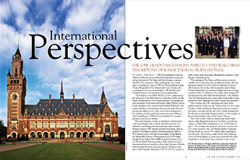International Perspectives
GW Law leads discussions abroad and welcomes the return of Judge Thomas Buergenthal
GW Law’s leadership crossed the Atlantic in May for a series of high-level symposiums, receptions, and special events in The Hague and Paris focusing on international law. The centerpiece of the weeklong trip was a formal dinner celebrating the career of GW Law Professor Emeritus Judge Thomas Buergenthal of the International Court of Justice, who is retiring from the court and returning to GW this fall as the Lobingier Professor of Comparative Law and Jurisprudence.
The European visit kicked off May 25 with a symposium at the prestigious Great Hall of Justice at the Peace Palace in The Hague spotlighting the role of legal education in preparing the next generation of international lawyers. Judge Theodor Meron, former president of the International Criminal Tribunal for the former Yugoslavia and a leading scholar in the field, delivered the keynote address at the event, which drew international law students, scholars, and practitioners from across Western and Central Europe. GW Law Dean Frederick M. Lawrence presented introductory remarks.
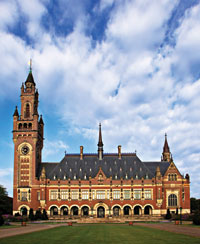
The Peace Palace in The Hague, Netherlands.
Anthony Donner
The panel discussion, focusing on the impact of international courts and tribunals in the evolution of international law, was chaired by Sean Murphy, the Patricia Roberts Harris Research Professor of Law at GW. Panelists included Yves Daudet, director general of The Hague Academy of International Law; Erika de Wet, professor at the University of Amsterdam; Dinah Shelton, the Manatt/Ahn Professor of International Law at GW; Ralph Steinhardt, the Arthur Selwyn Miller Research Professor of Law at GW; and Daniel Thuerer, president of the German Society of International Law and a professor of law at the University of Zurich. After the panel discussion, the group enjoyed a luncheon reception at which Stanimir Alexandrov, LLM ’93, SJD ’95, a partner at Sidley Austin, spoke about Judge Buergenthal’s substantive contributions to international law.
“The meetings in The Hague and Paris were an extremely valuable way of connecting with our alumni in Europe, allowing important members of our Law School community to interact with lawyers in those cities, and honoring the career of Judge Thomas Buergenthal,” says professor Murphy, who served as legal counselor at the U.S. Embassy in The Hague before joining GW and argued several cases before the International Court of Justice. “Our Law School has become a major player in the realm of international law, and I think the trip helped cement that reputation.”
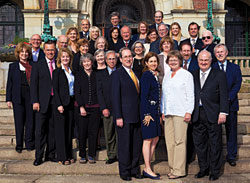
Dean Frederick M. Lawrence, Dr. Kathy Lawrence, Diane Knapp, and President Steven Knapp are joined by GW Law Board members, spouses, faculty members, and guests on the steps of the Peace Palace in The Hague before the May 25 symposium.
Anthony Donner
That evening, the GW contingent and other distinguished members of the bar and bench gathered at the Lange Voorhout Palace and Escher Museum for a formal reception and dinner honoring the life and work of Judge Buergenthal. For the past decade, Judge Buergenthal has served as judge on the principal judicial organ of the United Nations.
One of the world’s foremost international human rights experts, Judge Buergenthal survived two Nazi concentration camps as a child before immigrating to the United States at age 17. The acclaimed law professor and author was the first U.S. citizen elected to the U.N. Human Rights Committee and has served on various U.N. human rights commissions over the years. He served as a judge on the Inter-American Court of Human Rights, an autonomous judicial body of the Organization of American States, and later as that court’s president. During his tenure, Judge Buergenthal helped end the practice of disappearances in Honduras and helped secure the government of Guatemala’s compliance with a court order ending executions of human rights activists by special tribunals. He was the co-recipient of the 2008 Gruber Foundation International Justice Prize for his contributions to the promotion and protection of human rights; from the award money, he made a substantial donation to the Law School in support of the Thomas Buergenthal scholarships for International Master of Laws students.
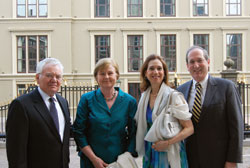
Judge Thomas Buergenthal and wife Peggy join GW Law Dean Frederick M. Lawrence and wife Kathy outside Mauritshuis, the renowned art museum, on the group’s first evening in The Hague.
Laura Ewald
“Judge Buergenthal is one of the great figures in international law and human rights law of our time, and he is a shining example of a lifetime of commitment to promoting the rule of law and international peace and justice through the teaching, study, and practice of law,” Dean Lawrence says. “He is respected the world over as an advocate for peace and justice, and we are exceedingly grateful that he is returning to GW Law to help shape future generations of legal practitioners on the global stage.”
Addressing the gathering, which included presidents and judges of international courts and tribunals, as well as ambassadors from several countries to the Netherlands, Judge Buergenthal said he is looking forward to returning to the Law School. “I taught at GW for 10 years and liked it very much,” he said. “While I will miss the court, I am happy to return to my friends at the Law School and in Washington.”
The following day, members of The George Washington University Law School Board of Advisors held their spring meeting in The Hague. The meeting, webcast live to advisory board members unable to travel to Europe, focused on GW Law’s global presence.
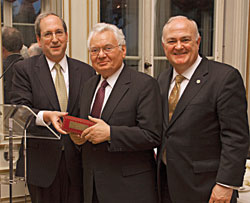
Dean Frederick M. Lawrence (left) and President Steven Knapp present an inscribed pen to Judge Thomas Buergenthal on behalf of The George Washington University Law School.
Anthony Donner
“This is the Law School’s first, but by no means last, international board meeting,” says Dean Lawrence, who advocated for “taking the spring meeting abroad” this year to continue the group’s conversation begun in the fall on the increasingly internationalized nature of law and society and its implications for both GW Law and legal education. “It was a real watershed event for our Law School.”
Addressing the board, GW President Steven Knapp, who accompanied the group to Europe, spoke about the university’s international dimensions—lauding the Law School’s fast-growing network of active, engaged LLM alumni around the globe, as well as its thriving international collaborations with universities in India and Europe.
GW Associate Dean for International and Comparative Legal Studies Susan L. Karamanian updated the Law School’s Board of Advisors on the impressive GW Law faculty in the field of international and comparative law as well as the curriculum, which includes more than 50 courses offered in Washington, D.C. GW Law students also benefit from many additional overseas course offerings through programs such as the GW-Oxford Program in International Human Rights Law and the Munich Intellectual Property Law Summer Program, as well as under exchange programs in Mexico, Canada, and Europe.
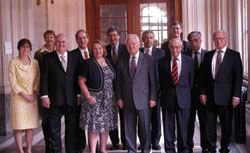
The European visit began with a symposium at the prestigious Great Hall of Justice at the Peace Palace in The Hague. (Left to right) Susan Karamanian, Erika de Wet, President Steven Knapp, Dean Frederick M. Lawrence, Dinah Shelton, Ralph Steinhardt, Judge Thomas Buergenthal, Stanimir Alexandrov, Judge Theodor Meron, Sean Murphy, Daniel Thuerer, and Yves Daudet.
Luke Wilson, JD ’09, GW’s Gruber Foundation International Law Fellow at the International Court of Justice, rounded out the discussion by briefing the board on the value of his experience at the ICJ. GW Law is one of the few law schools in the country that provide funding for a graduate to serve as a clerk on the International Court of Justice; the coveted position is underwritten by a generous grant from the Gruber Foundation.
“There is nothing that compares to the experience that I had at the International Court of Justice as a law clerk and the Gruber International Law Fellow,” Mr. Wilson says. “The ability to engage in the work of the court—and to see an intimate view of the pre-eminent international law tribunal in the world—is an opportunity that trained me to be a better lawyer and a better student of international law. Without the international law education that I received from the superb faculty at GW and the financial support of the Gruber Foundation, this year would not have been possible. I am proud to have been one of the GW students to benefit from GW’s expanding international presence and from the generosity of alumni and donors who will continue to help GW students and graduates find and follow opportunities at international organizations and international tribunals.”
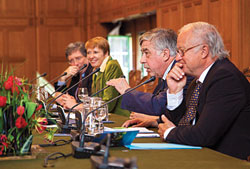
Panelists (left to right) Ralph Steinhardt, Erika de Wet, Daniel Thuerer, and Yves Daudet at the Peace Palace
Anthony Donner
For the group’s final evening in The Hague, the GW contingent and special guests honored Judge Buergenthal at a reception at the residence of U.S. Ambassador to the Netherlands Fay Hartog Levin. At the event, Judge Buergenthal expressed gratitude for his time on the court and said he looks forward to returning to GW Law, which he called “home.” “The evening was a fitting tribute to Tom Buergenthal, and we were very grateful to the ambassador and her staff for their incredible hospitality,” Dean Lawrence says.
Then on May 27, it was off to the City of Lights for a symposium on international law at the Sorbonne. The panel discussion, focusing on the transformation of the legal profession in an increasingly interrelated world, was moderated by Associate Dean Karamanian. Panelists included Geneviève Burdeau, professor of international law at the Université Paris; John Lowe, JD ’79, general counsel of Qioptiq in Paris; and Jean-Claude Petilon, JD ’67, a partner in Fasken Martineau’s Paris office.
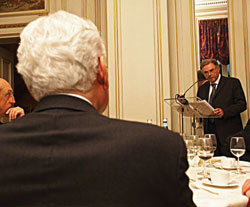
Professor James Crawford of the University of Cambridge gives the after-dinner remarks in honor of Judge Buergenthal.
Anthony Donner
“The session at the beautiful Amphitheatre Descartes at the Sorbonne was a perfect closing to a successful week in Europe,” Associate Dean Karamanian says. “The remarks from our panelists about the challenges to the legal profession stimulated a lively discussion. I left the Sorbonne on a sun-filled spring day knowing that as a legal educator I face many more interesting challenges.”
Another Paris highlight was an evening reception in the elegant grand salon of the 17th-century Hotel d’Aubusson, where Dean Lawrence, President Knapp, and the GW delegation met with some 25 Law School alumni living and working in Paris and throughout Europe. GW’s extensive international alumni community in Europe includes a substantial group of LLM degree recipients—a number of whom attended the Paris event.
“I cannot imagine that our first board trip abroad could have worked out better,” says GW Law professor Steven Schooner, co-director of the Government Procurement Law Program. “The various venues we enjoyed in The Hague and in Paris—the Peace Palace, the Sorbonne, the ambassador’s residence, and the museums—were exquisite and memorable. But the best part was the opportunity to spend time with some of our most successful and interesting alumni in relaxing and, of course, attractive settings.”
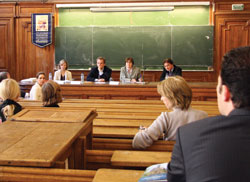
Panelists (left to right) Geneviève Burdeau, John Lowe, JD ’79, Associate Dean Susan Karamanian, and Jean-Claude Petilon, JD ’67, at the Sorbonne
Fran Molingo
Reflecting on the weeklong experience, Douglas E. Davidson, JD ’71, chair of the Law School Board of Advisors, says the trip was a unique opportunity to experience “the breadth and outstanding reputation of GW’s international law program and faculty.
“Beyond that,” adds Mr. Davidson, a partner at Morgan Lewis, “we were all privileged to participate, through a superbly organized series of programs, in honoring Tom Buergenthal for his work on the ICJ, for his devotion to human rights and decency, and, indeed, for his humanity.”
Dean Lawrence concludes: “Our mission to The Hague and Paris was a groundbreaking event for the Law School and for the university. Our priority is to prepare our students for the world in which they will practice, and it is more and more clear that this will require a heightened sophistication with respect to international and transnational issues. Our journey presented us with the opportunity to understand better how we can educate our students to be leaders in the worldwide community that they will be entering. We all gained important perspectives and insights that will help us to continue to grow as a pre-eminent international law school.”

